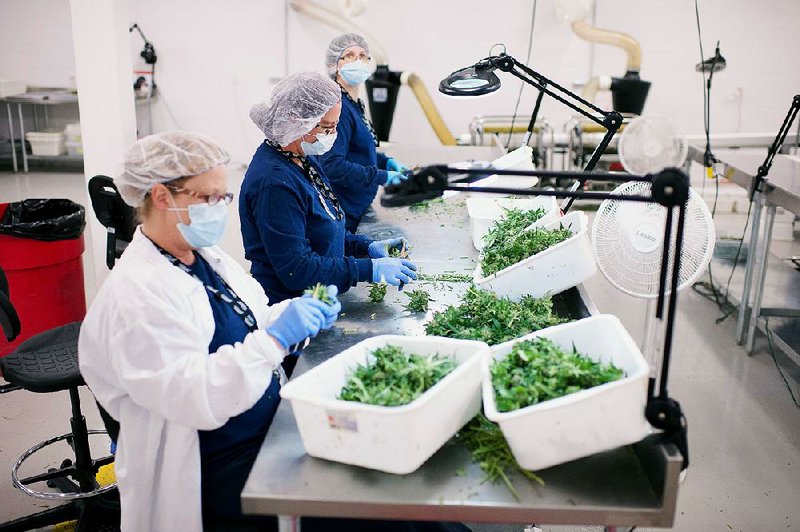The surge of capital into Canada's nascent marijuana industry has sent stock prices soaring -- and brought warnings it's a bubble that could soon burst.
The value of 26 marijuana stocks listed in Canada has swelled to almost $3 billion from close to nothing in the past two years, as investors rushed to bet on the country's move toward legalizing recreational use. Canopy Growth Corp. became the first marijuana unicorn -- a startup attaining $1 billion in market valuation -- on Wednesday. Other producers, including OrganiGram Holdings Inc. and Aurora Cannabis Inc., saw their share prices surge more than 250 percent this year.
While investor optimism is being fueled by analysts' estimates that there could be about 3.8 million recreational marijuana users in Canada by 2021 and billions in sales, there's mounting concern that companies are overvalued. How Canada will regulate, tax or distribute the products, remains unknown, and some of the publicly traded companies have yet to make a sale.
"Oh, they're going to pop," Nick Brusatore, the largest shareholder of Affinor Growers Inc., said by phone. Once a mining company, the Vancouver-based firm now develops greenhouse technology for crops, including cannabis. "It's going to pop hard."
Canada is on track to become the first Group of Seven country to legalize pot for recreational use if it pushes forward with introducing legislation in 2017. It would join eight U.S. states where it won't be a state crime to use the drug recreationally by January and follows Uruguay, which became the first country to legalize it in 2013.
Chris Damas, an analyst at BCMI Research in Barrie, Ontario, likens the capital pouring into the sector to the dot com craze of the 1990s. At the time, the value of technology stocks rose rapidly as investors saw opportunity in the Internet's growth despite the fact many companies had no revenue, he said.
Many holders of marijuana stocks that have increased tenfold are company insiders, and the market could crash if they decide to start selling to take profits, Damas said. "It does smell like a real serious bubble," he said in a telephone interview.
Companies started piling into the sector after Canada changed rules governing medical use to allow access only through licensed producers. In 2013, Health Canada began approving licenses and six medical marijuana companies began trading on the TSX Venture Exchange. When Prime Minister Justin Trudeau wooed voters with a promise to legalize the drug in the country's 2015 election campaign, the industry began to take off.
The market went into a frenzy ahead of a report to the government in November that laid out practical issues surrounding legalization.
For their part, many marijuana companies say investors are betting on future growth.
"The stocks are not overvalued," said Denis Arsenault, chief executive officer at OrganiGram. Volumes have risen alongside prices, which signals that investment funds are becoming more comfortable with the industry and the idea that a legal one will soon exist in Canada, he said. "The investment community is waking up to the reality this is going to happen."
Cam Battley, executive vice-president of Aurora, whose market value has risen to about $440 million from about $38 million this year, said that unlike pharmaceutical companies, which have long lead times between startup and generating revenue, marijuana companies will become profitable faster as there's pent-up demand for product and millions of potential customers. "It's been a remarkable fast growth period for us," Battley said.
Canopy has more than 500,000 square feet of production space and has proven it can raise and deploy capital, said Chief Executive Officer Bruce Linton. Smith Falls, Ontario-based Canopy, which operates out of an old Hershey chocolate factory, has the most substantial production facilities, and Canada will have a multibillion-dollar marijuana market when prohibition ends, he said.
In the U.S., the cannabis market in legal states totaled $6 billion in 2015 and is expected to reach $50 billion in 2026, according to data from Cowen & Co. But the drug remains illegal at the federal level and publicly traded companies are largely in auxiliary industries selling such things as seed kits and lotions, or raising investment funds for the industry.
That makes Canada a destination for investors who want to focus on producing and distributing the drug, said Brendan Kennedy, chief executive officer of Seattle-based Privateer Holdings Inc. Privateer has raised $120 million to invest in cannabis companies including closely held British Columbia-based producer Tilray.
That said, securities regulators have issued an "unprecedented" number of warnings to investors regarding the risks of cannabis penny stocks, Kennedy said.
Last year, a review of issuers entering the medical marijuana business by the Canadian Securities Administrators found 25 "raised serious investor protection concerns" because of deficiencies in their disclosures.
"Most of these companies are unproven," Kennedy said Monday. "They're all based on a hope and a prayer." Still, there's massive opportunities in the industry with other countries such as Germany and Australia also looking at moving into medical marijuana, he said.
While Affinor investor Brusatore is bracing for a pot bust, he's betting another big investor will eventually move into the sector: Tobacco companies.
"I'm pretty sure the tobacco boys are already getting their tie-ups happening right now."
Information for this article was contributed by Jennifer Kaplan, Eric Lam and Aoyon Ashraf of Bloomberg News.
Business on 12/09/2016

